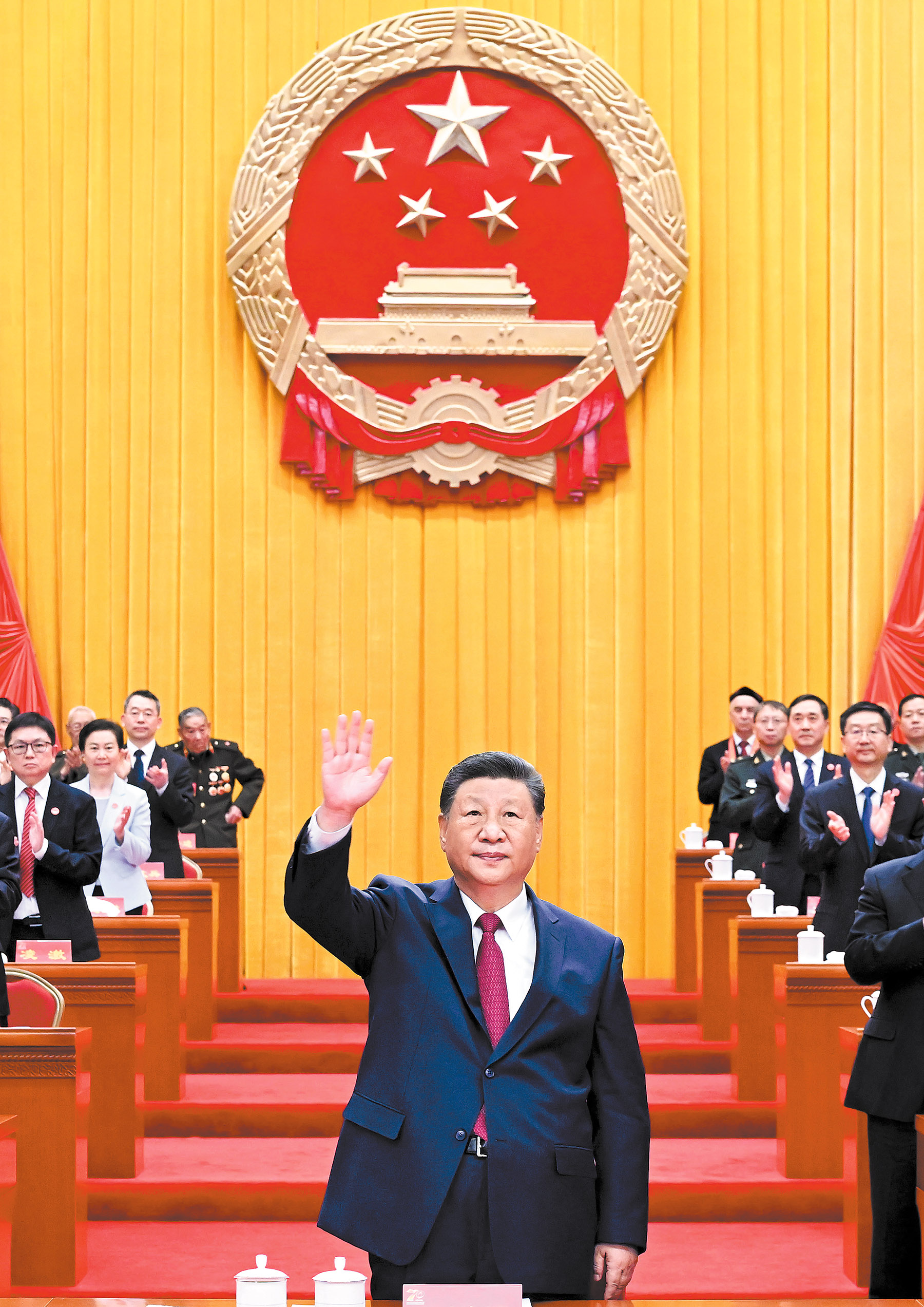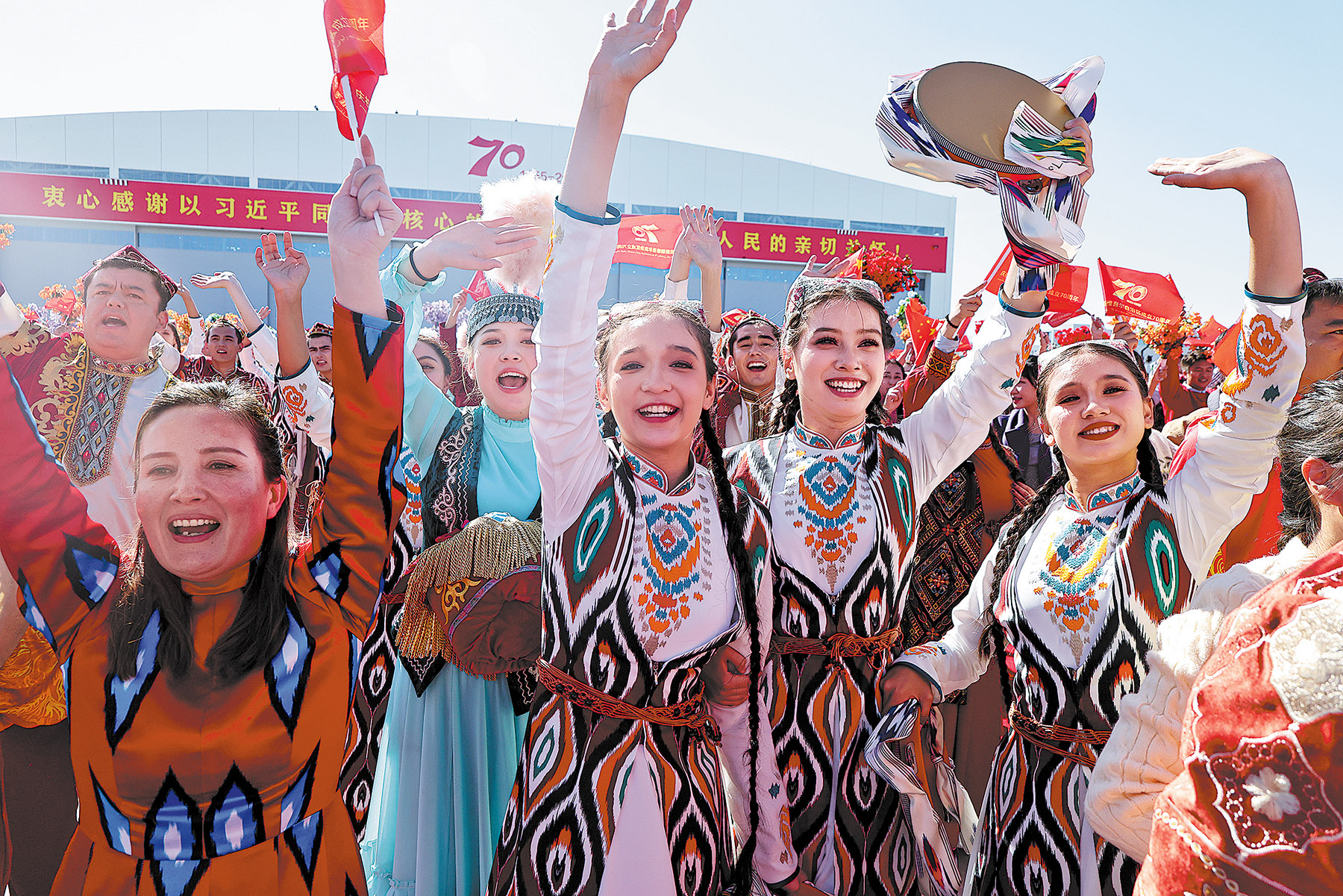Xinjiang’s development reflects vigor of Party’s leadership, socialist system

President Xi Jinping joined local officials and members of the public from all ethnic groups and walks of life at a grand gathering on Sept 25 in Urumqi, the regional capital, to celebrate the 70th anniversary of the founding of the Xinjiang Uygur autonomous region.
Xi, who is also general secretary of the Communist Party of China Central Committee and chairman of the Central Military Commission, led a central delegation to Xinjiang on Sept 23 for a series of events. It was his fourth visit to the region since the 18th National Congress of the CPC in 2012.
The event on Sept 25 commenced at around 10:30 am. A congratulatory message from the CPC Central Committee, the National People’s Congress Standing Committee, the State Council, the Chinese People’s Political Consultative Conference National Committee, and the Central Military Commission was read out.
On Oct 1, 1955, the Xinjiang Uygur autonomous region — now home to over 26 million people of various ethnic groups in Northwest China — was formally established, marking a milestone in the region’s development and a new success of the CPC’s policies on ethnic affairs.
Addressing the event, Wang Huning, chairman of the CPPCC National Committee and head of the central delegation, said the achievements made by Xinjiang over the past seven decades reflected the strengths of the Party’s leadership and the socialist system, as well as the strong vitality of the correct and distinctively Chinese approach to handling ethnic affairs.
Xinjiang, together with the rest of the country, won the battle against poverty and completed the building of a moderately prosperous society in all respects, Wang said. He noted that ethnic unity in Xinjiang has been further consolidated, and the sense of community for the Chinese nation has been strengthened.
As Xinjiang writes its own chapter in Chinese modernization, Wang urged continuous efforts to uphold and strengthen the Party’s overall leadership, maintain social stability, safeguard the unity of the Chinese nation, promote high-quality development centered on the people’s well-being, deepen reform, and expand opening-up.
He stressed that the stability and unity in Xinjiang have not come easily and must be cherished.
Efforts must be made to consolidate the region’s peace, unity, and stability, enhance and innovate social governance, and build a strong wall to safeguard social stability and lasting peace and security, Wang said.

Amiragul Abdul, principal of a kindergarten in Bachu county of Kashgar prefecture, shared in her speech at the gathering how she has personally witnessed the tangible changes in Xinjiang.
She recalled that when she first started working, the kindergarten was still a mud-brick building with very basic facilities, and many children of kindergarten age were still playing in the fields.
“Today, all preschool children in rural areas of Xinjiang can enjoy three years of free education, and kindergartens have become the most beautiful buildings in the villages,” she said.
“Changes are not just in infrastructure,” she added. “Over the years, through the assistance program for Xinjiang, our children have frequently connected via video with peers in kindergartens thousands of kilometers away, singing, dancing, and practicing calligraphy together.”
In this way, the seeds of fostering a stronger sense of the Chinese nation as one community are taking root in their hearts, she said.
Urumqi bus driver Gu Xiangfeng told the gathering that in his more than 30 years in the industry, he has experienced the rapid changes across the city while driving daily through its streets.
“The city’s roads used to be mostly gravel, turning muddy after rain or snow. Today, bumpy dirt roads have become smooth asphalt avenues, and the old buses have been replaced by green new energy vehicles, making commuting far more convenient for the public,” Gu said.
“In the days ahead, I will continue to hold the steering wheel, drive safely every kilometer, serve every passenger wholeheartedly, and contribute all my strength to building a modern socialist Xinjiang,” he said.
Xi left Urumqi for Beijing on Sept 25 after attending events in celebration of the 70th anniversary of the founding of the autonomous region.
Instructed by Xi, a central delegation led by Wang visited various places in Xinjiang from Sept 25 to 28 and conveyed greetings to people of all ethnic groups and from all sectors of society.
Contact the writers at mojingxi@chinadaily.com.cn


